ICTC Overviews summarize findings from full-length studies. To read the original report, visit it here.
Study Scope
This research report provides insight into how to strengthen Canada’s ability to commercialize artificial intelligence (AI) technology and support its responsible and sustainable growth.
The paper discusses:
- The economic imperative for commercializing AI R&D and what is needed for AI commercialization, including the legal and technical infrastructure for data sharing, storage, and processing centres
- The required current and future AI skills and talent — direct skills for designing, building, and delivering AI, and the indirect skills needed for ethical and legal oversight, and the need for multidisciplinary talent
- The need for responsible AI governance and relevant modern privacy legislation and industry standards, conformity assessments, and other governance tools

Study Context
Budget 2021 started building a comprehensive AI strategy by earmarking up to $443.8 million over 10 years for renewing the Pan-Canadian Artificial Intelligence Strategy and making other significant investments in AI.
The first edition of the Pan-Canadian AI Strategy was launched in 2017, with a $125 million budget proposal. The Strategy’s scope focused largely on academic research initiatives, with a limited focus on commercialization.
Guiding Insights
The three pillars of a comprehensive, sustainable, and adaptable national AI strategy focus on:
- Commercialization and economic benefit
- Developing AI talent and skills for success
- Responsible AI governance and ethics
A clear industrial AI strategy will require multi-participatory and coordinated collaboration between government, industry, academia, civil society, and the public.

Alexa Steinbrück / Better Images of AI / Explainable AI / CC-BY 4.0
Study Findings
Economic Imperative for AI Commercialization
The Pan-Canadian AI Strategy focused on academic research, which is disproportionately geared towards early-stage innovation.
A new industrial AI strategy, however, also needs to foster late-stage patent-rich product development and commercialization.
- Budget 2021 added an additional $185 million in the Pan-Canadian AI Strategy to “support the commercialization of AI innovations”
The Role of Intellectual Property (IP)
One measure of success for the Canadian AI ecosystem is Canadian innovators both creating, owning, and further commercializing and scaling their IP.
- Early-stage Canadian innovators often face challenges to commercialization, causing many to sell their IP rather than commercialize new products and grow their businesses
- Approximately 50% of ICTC’s sample of 209 Canadian AI startups were acquired or bought by another company (24% went out of business, 19% went public)
These relatively low levels of IP ownership and retention could deprive the Canadian economy of long-term benefits.
Helping Canadian AI Startups
Canadian companies need to be export driven and reach global markets, which requires growth capital (venture capital, angel investment, incubator funding, private equity, and commercial bank loans).
- In comparison with US companies, Canadian companies take longer to obtain their first round of financing, go through fewer rounds of financing in total, and “raise significantly less money before exiting” (University of Toronto study)
- For Canada to create more world-class companies, Canadian tech companies will need to get funding sooner and with larger sums to be able to drive growth
Government procurement opportunities can represent an income stream for Canadian start-ups and the ability to test, refine, and scale products and services.
Strategic International Partnerships
Foreign investors account for a significant portion of Canada’s private-sector funding. Foreign companies are key partners in Canadian academic research.
- Canadian subsidiaries of foreign companies can provide high-paying and highly skilled work opportunities, increased innovation capacity, and other positive spillover effects
- Canada is a valuable partner to foreign companies, given its highly skilled workforce, generous tax credits, and R&D support
Securing IP Rights in Academic Partnerships
A key recommendation of a Government of Ontario Expert Panel on Intellectual Property in spring 2019 was to establish “a centralized provincial resource to provide consistent, sophisticated legal and IP expertise and education.”
This recommendation would align Ontario closer to Québec and other innovation economies globally.
Securing IP Rights in Industry
The process of securing IP can be complex and time consuming in Canada, but IP is a business tool, and Canadian entrepreneurs must be able to make informed decisions about their IP.
IP ownership and retention legal advice and enforcement can also be costly, however:
- Budget 2021 proposes funding for two new initiatives — $90 million to help accelerators and incubators provide startups with access to expert IP services, and $70 million for the National Research Council to provide high-growth clients with IP services
- Canada’s Digital Technology Supercluster also is responsible for working “with Members to help ensure that investments in innovation are protected,” and to “support the cost of obtaining IP protection in cases of demonstrated need”
AI Talent and Skills
While AI researchers and PhDs are foundational to digital innovation and adoption, building an economically vibrant AI commercial ecosystem in Canada also requires skilled talent and quality refined data to fuel the deep learning and machine learning algorithms.
The role of data engineer has emerged as central to AI product development. Traditional AI enabling roles include data scientists and data analysts.
These professionals also require domain knowledge of specific sectors where AI is applied and strong interpersonal skills to work in multidisciplinary product teams.
In-Demand AI Skills
Both direct skills for the design and build of AI systems and indirect skills for oversight, ethics, privacy, legal, and audits are needed.
For direct skills, Monica Rogati’s AI Hierarchy of Needs provides a framework to gauge AI skill demands:
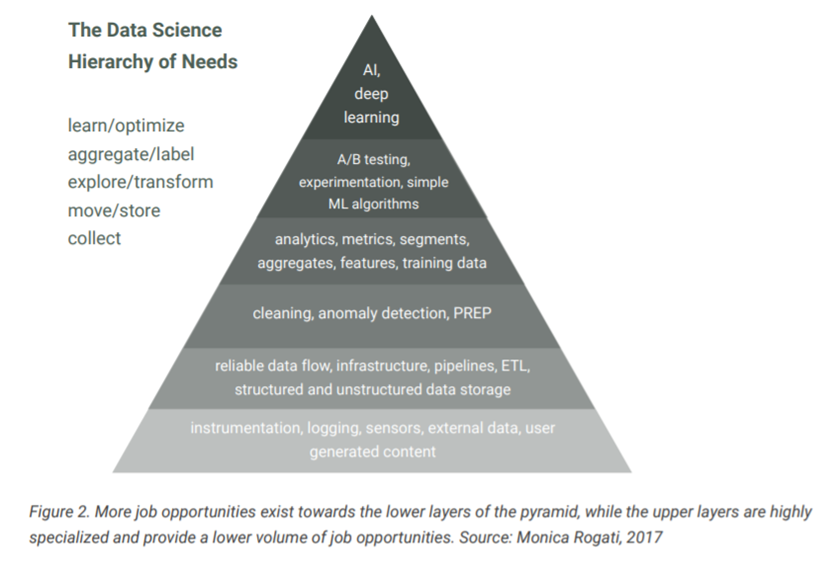
The skills associated with data engineer, data analyst, data scientist, ML engineer, and AI architect overlap, but there are clear distinctions as well:
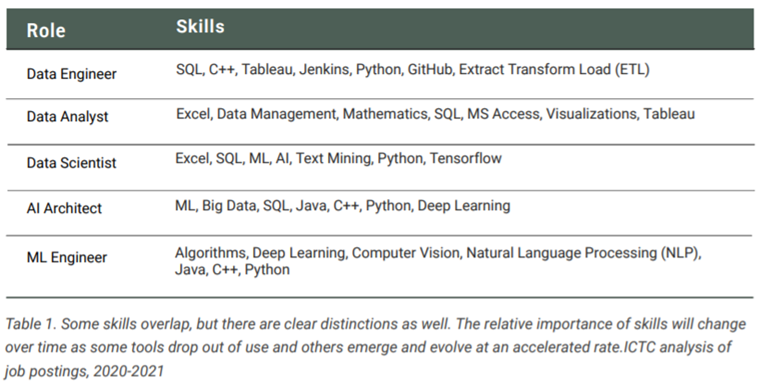
More difficult to define, but no less important, are the indirect skills related to ethical AI oversight and responsible AI operations. Three areas of indirect skills consist of the following:
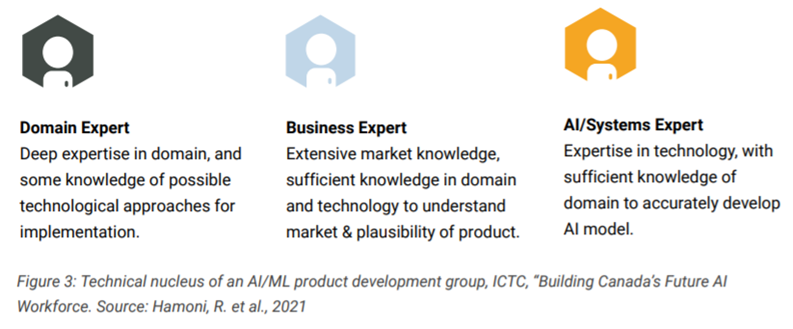
“Canada’s strategy for AI skills development should include cross-training as a fundamental pillar in workforce development efforts.” — ICTC, Building Canada’s Future AI Workforce
Various countries attempt to bridge the gap between direct and indirect skills through AI-related online courses. For example, Singapore offers multidisciplinary training programs like AI for Industry (AI4I) and the AI Apprenticeship Programme (AIAP).
- Singapore’s apprenticeship program is an intensive nine-month full-time structured program (12 months for people aged 40 and above), including a monthly stipend and seven months on-the-job training
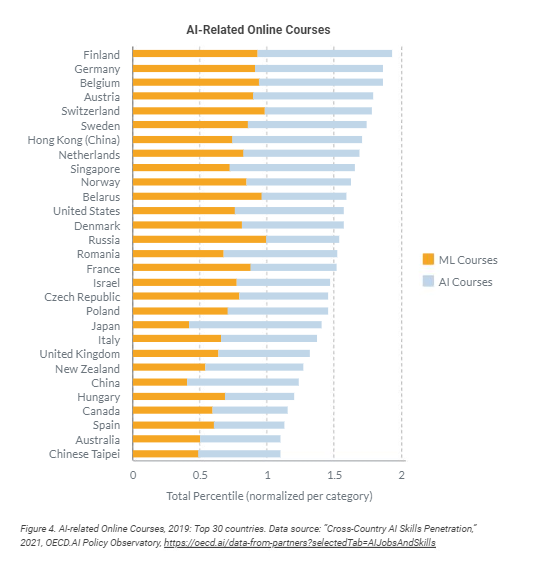
Sourcing Talent
Building the Canadian AI talent pipeline will involve both developing domestic talent and attracting and retaining international AI practitioners.
- Canada’s Budget 2021 acknowledged this dual pipeline, and provides funding for securing academic talent across the country via $162 million over 10 years to be delivered by the Canadian Institute for Advanced Research
Canada’s AI skills strengths when compared to other countries on a relative population basis:
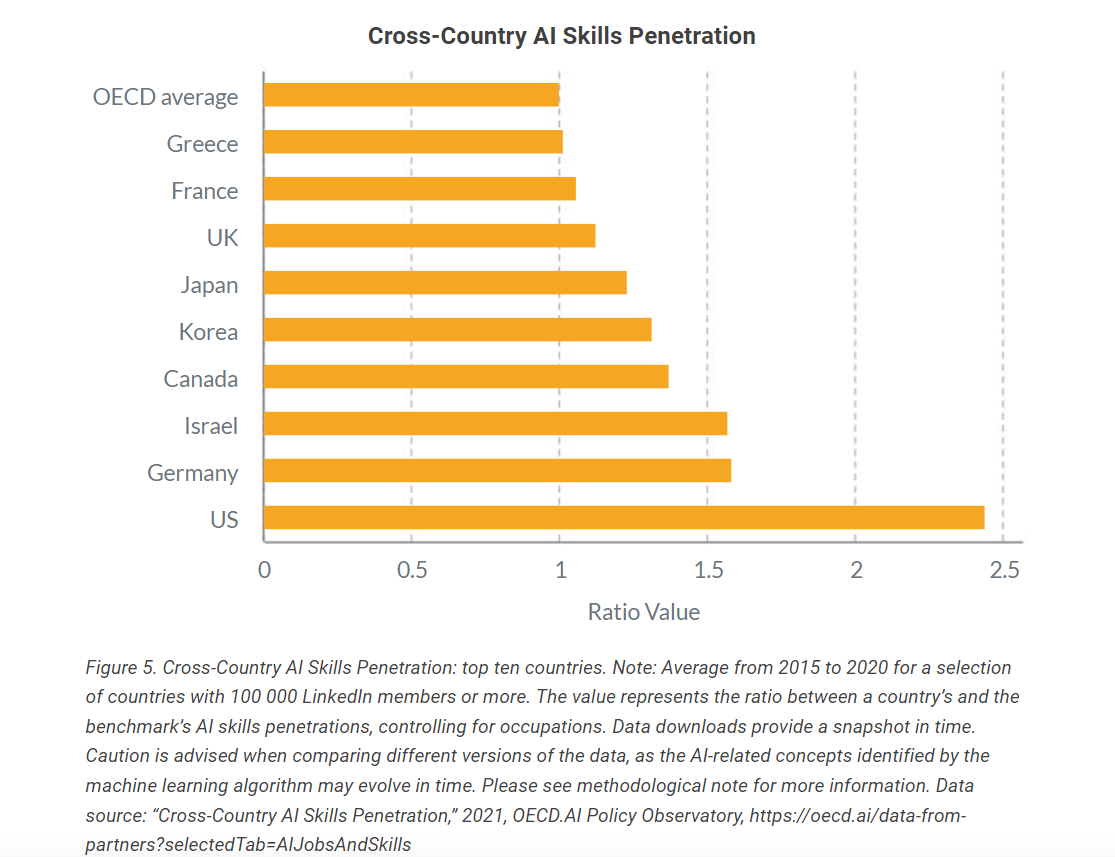
Competitive salaries for AI talent are a key metric. Canada is competitive with many international jurisdictions, but there is a significant salary gap between Canada and the United States for in-demand AI talent:
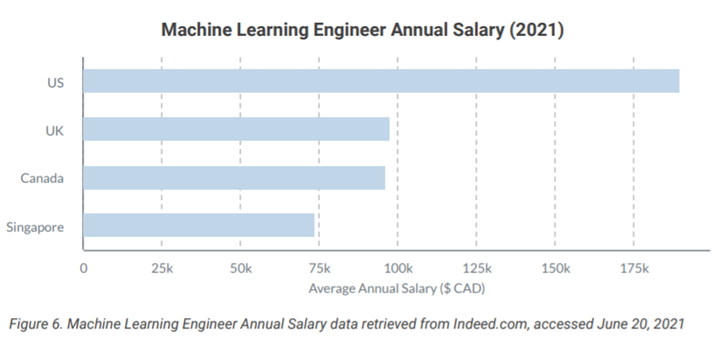
Canada is still a popular destination for in-bound AI talent but to maintain that status, it must stay vigilant. Competitive wages are one dimension, however, numerous initiatives can help in the wage calculation:
- In The Netherlands, expat employees who meet eligibility criteria are exempt from income tax on up to 30% of their salary
- Romania currently offers a special tax regime for some tech workers, whereby their entire salary is exempt from taxes
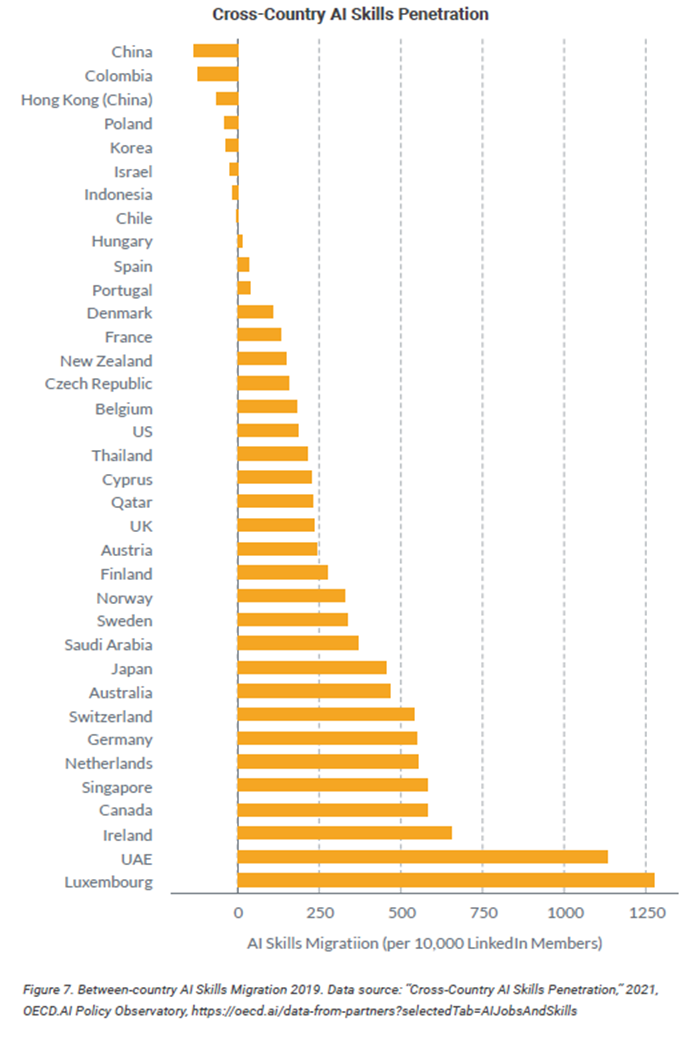
Responsible AI Innovation
Renewed investment in the Pan-Canadian AI Strategy — with specific funding earmarked for commercialization — presents a unique opportunity to drive responsible AI innovation in the private sector.
At least three things can help clarify approaches to responsible AI governance:
1. A unified and principled approach to AI governance through a Responsible AI framework (as well as model governance frameworks for both the public and private sectors)
2. A comprehensive study to help foster enhanced understanding of the risks and harms posed by the misuse of AI, and regulatory solutions to support public accountability
3. Enhanced clarity on how the responsible AI principles may be applied to standardization efforts and innovation programs to drive inclusive innovation and sustainable growth
Modern Privacy Legislation
While over-regulation can negatively impact innovation, particularly for SMEs, appropriate regulation can foster innovation and guidance to help remove barriers to growth, foster trust, and introduce technical standards.
According to a recent study by KPMG, business leaders overwhelmingly believe the government has a role to play in regulating AI technology.
In 2020, the federal government introduced Bill C-11 and the Quebec government introduced Bill 64: if passed, both would establish new legal tools to govern AI in their respective jurisdictions
Industry Standards and Governance Tools
Industry standards and governance tools will help build trust and provide regulators with a platform for AI harm protection, but this process will take time.
Industry standards were a key component of Budget 2021, earmarking $8.6 million under the second iteration of the Pan-Canadian AI Strategy “to advance the development and adoption of standards related to AI.”
Developing strong industry standards for AI should entail:
- Facilitating SME participation in standardization activities
- Enhancing the capacity and efficiency of the AI standards development process through subject matter experts and diverse steering committees
- Identifying new ways to comprehensively assess and certify AI systems
Inclusive Indicators for Innovation Success
IP retention and commercialization are important metrics for innovation success.
IP and intangible assets account for 90% of the total value of tech giants like Microsoft and Amazon, and 84% of the value of the top S&P 500 companies.
- Despite this, indicators used to assess Canada’s AI R&D programs do not account for domestic IP ownership
- A recent report by the Parliamentary Budget Officer also notes that apart from GDP and job growth, the Superclusters Initiative lacks “quantifiable performance indicators” for measuring the program impact on innovation
Beyond IP commercialization, retention, and ownership, it is important to establish indicators for inclusive economic growth to ensure the economy is working for everyone and includes metrics for sustainability, wealth inequality, and well-being.
Opportunities for Future Success
Canada has invested significantly in AI R&D, and Budget 2021 represents a willingness to continue advancing AI development. Strengthening Canada’s industrial strategy for AI will drive future growth and success.
ICTC proposes the following recommendations for an AI Industrial Strategy:
Establishing a clear industrial strategy for AI
- Strategy Development — A clear industrial strategy for AI can effectively align and coordinate Canada’s existing AI programs across government departments
- Innovation Supports — New and existing programs should prioritize Canadian IP ownership, retention, and commercialization. Programs involving international partnerships should seek to secure a strategic IP position for Canadian SMEs when possible.
Ensuring the right ingredients for late-stage R&D success
- Talent — Building and sourcing both targeted AI and broad ICT talent and skills is crucial, as well as attracting and retaining multidisciplinary talent that understands how to apply AI. Canada should implement international best practices for talent attraction and retention
- Regulatory and Digital Infrastructure — Changes to privacy legislation and other legal infrastructure are needed to enable data sharing in key industries like healthcare and financial services (as well as secure, technical methods for data sharing). Also crucial is affordable telecommunications infrastructure, including data storage and processing centers, computing infrastructure, and high-speed internet access
Driving responsible, inclusive growth
- Governance — Canada has the opportunity to become a global leader by developing governance and industry standards to drive inclusion and accountability in AI development
- Enabling Responsible AI — There is an urgent need to establish an inclusive and accountable framework to not only mitigate but proactively prevent the potential harms stemming from technology solutions.
Updated and new regulation can guide inclusive, accountable, and responsible AI in government and industry.
ICTC Overviews summarize findings from full-length studies. To read the original report, visit it here.
